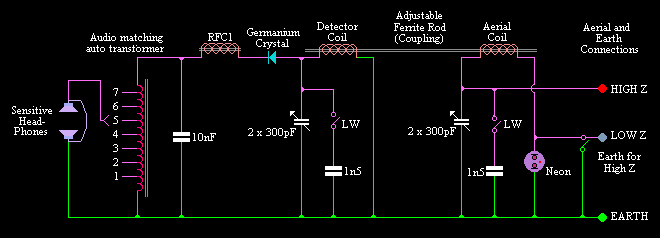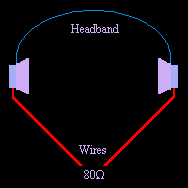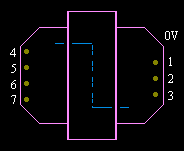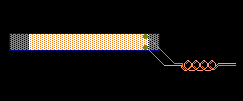Here is my design using fairly modern parts.
With it I came 1st in my local radio club home constructions contest a few years ago,
mainly because it was so LOUD.
It gives VERY good sensitivity & selectivity.
In South London with 40M of aerial wire it can pick up 7 MW & 4 LW stations (3 French) during the day.
The stronger ones can even just about drive a good small 8ohm LS.
FEATURES -------- 1/ DUAL TUNED CIRCUITS for Selectivity. 2/ VARIABLE COUPLING for Sensitivity/Selectivity. 3/ VARIABLE INDUCTANCE also widens the tuning range. 4/ DUAL BAND, MW & LW, plug in capacitors extend range to LW. 5/ HIGH & LOW AERIAL IMPEDANCE option, for best matching. 6/ AERIAL NEON gives visible protection against High Aerial Voltages. 7/ LENS to see "CAT's WHISKER on the CRYSTAL" 8/ R.F.C. to improve diode linearity & sensitivity performance. 9/ TAPPED AUDIO MATCHING TRANSFORMER for optimum loudness. 10/ HIGH EFFICIENCY HEADPHONES home made.
THE CIRCUIT -----------
 PARTS & TIPS
------------
PARTS & TIPS
------------THE BASE
Use a wooden base board about 1x 25 x 10cm. Fit rubber feet so that underside protrusions don't scratch.
CIRCUIT WIRING
Use tin plate strips tacked down, this is easy to solder to & support the smaller components.
HEADPHONES
 Use a coat hanger wire head band to connect 2x 40ohm 1970s telephone inserts
(type 4T) rocking armature type. These are the most sensitive transducers made
& peak @ 3kHz. They are around 10dB louder once matched than any high Z moving
iron diaphragm, moving coil, or crystal types.
Make a headband from a single piece of coat hanger wire looped at each end & flattened (hammered) as the common connection under 2 of the terminal nuts.
Bend the wire to angle the inserts to sit on your ears comfortably. They can be connected permanently to the set with flexible leads or with a plug & socket for comparing with other headphones.
Wind a couple of turns of the insulated wire around the headband as strain releaf.
Use a coat hanger wire head band to connect 2x 40ohm 1970s telephone inserts
(type 4T) rocking armature type. These are the most sensitive transducers made
& peak @ 3kHz. They are around 10dB louder once matched than any high Z moving
iron diaphragm, moving coil, or crystal types.
Make a headband from a single piece of coat hanger wire looped at each end & flattened (hammered) as the common connection under 2 of the terminal nuts.
Bend the wire to angle the inserts to sit on your ears comfortably. They can be connected permanently to the set with flexible leads or with a plug & socket for comparing with other headphones.
Wind a couple of turns of the insulated wire around the headband as strain releaf.
AF TRANSFORMER
 For best load matching & volume, I used 8 equal windings of an old telecomms line transformer that had 2x 600ohm windings in 4 sections each. The first 2 windings are paralleled up for low Z loads to reduce the winding resistance loss for low Z loads.
For best load matching & volume, I used 8 equal windings of an old telecomms line transformer that had 2x 600ohm windings in 4 sections each. The first 2 windings are paralleled up for low Z loads to reduce the winding resistance loss for low Z loads.
Adjustable connection is made with a small wander crocodile clip to the linking straps. Typically 2-3 of the 7 taps gives the best for the 80ohm headphones. Mount it well to the base board (e.g. 2 screws tapped into the 4 plastic corners not near the winding!) as it is heavy component.
 If a suitable comms transformer is not available try some small mains transformers that can give
4:1-3:1 e.g. 110V to 15-0-15V, try fine ratio adjustment by 1st using it as a straight
transformer then as an auto transformer with the windings in series, & try adding or subtracting
the secondary (reverse connections) to alter the ratio & use which ever gives the loudest volume.
You may also try paralleling the headphone earpieces to change the load.
If a suitable comms transformer is not available try some small mains transformers that can give
4:1-3:1 e.g. 110V to 15-0-15V, try fine ratio adjustment by 1st using it as a straight
transformer then as an auto transformer with the windings in series, & try adding or subtracting
the secondary (reverse connections) to alter the ratio & use which ever gives the loudest volume.
You may also try paralleling the headphone earpieces to change the load.
10nF CAPACITOR
This is used for blocking RF from the AF circuit.
Theory says yes it is need, but it is not really necessary component as it works without it.
R.F. Choke
Approx 20 turns of enamelled copper wire (0.5mm) on small polo mint sized (12mm dia) toroidal RF ferrite core. Again theory says yes it is needed as it will keep the diode conduction angle high & hence reduce the diode resistive losses, but it does work without it. It will also makes the load impedance on the tuned circuit 2x higher as mean not peak voltage & currents are reduced by v2. Mount with an insulated screw (not to cut into the turns) through the middle.
GERMANIUM DIODE
Viewable old large glass bubble type e.g. an old OA91.
 Mount a small plastic lens (from cardboard slide viewer) 2cm in front of the crystal with shaped
paper clip wire, so that the surface of the crystal & the internal cat's whisker can clearly be seen.
Mount a small plastic lens (from cardboard slide viewer) 2cm in front of the crystal with shaped
paper clip wire, so that the surface of the crystal & the internal cat's whisker can clearly be seen.
GANGED 300pF VARIABLES
Two needed, air spaced ideally. Large value gives best tuning range, so the sections are paralleled up.
Put knobs on the shafts & mount them well to the baseboard, as they get a lot of tweaking.
1n5 LW CAP
Two needed. Connected one side to ground & the other to a 2mm wander test plugs/sockets to give the Long Wave coverage.
FERRITE ROD
Standard radio type 14cm long, 8mm dia. It gives plenty of L adjustment & coupling variation. With the coils the ferrite gives high Q tuned circuits, many times higher than lit's wire air space coils! Mount with plastic cable clip in the middle (not shorting metal turn!) with high enough packing/washers to allow coils to be moved. The ferrite rod is quite fragile, if it does get broken just glue it back together with a 2 part epoxy resin, removing as much glue gap with presure while setting as possible.
COILS
 Two standard MW radio type with tags, e.g. about 30 turns of 0.5mm enamelled copper wire on a loose fitting paper tube with connection tags.
Two standard MW radio type with tags, e.g. about 30 turns of 0.5mm enamelled copper wire on a loose fitting paper tube with connection tags. Connect with twisted flexible leads as they will need sliding along the ferrite rod to vary the inductances & coupling.
NEON
Wire ended 80V bulb type. Used for safety, it gives a dramatic flash discharge indication when the aerial is in the low Z mode, when static is around. It also protects the Caps from much higher voltage flashovers!
CONNECTIONS
4mm socket with screw up type for Earth & the 2 Aerial options, with a swinging earth link plate, to make the high Z aerial configuration.
For the headphone, I used 6mm (1/4") Jacks, but screw up 4mm are fine also.
LAYOUT

TUNING IN
--------------
1/ Connect an earth, mains earth can be noisy, old Gas & Water pipes are better earths as long as they are not PLASTIC! Try a counterpoise along the ground if there is too much mains QRM on water pipes etc.
2/ Connect the aerial to either the High Z or Low Z options. Short aerial wires compared to a 1/8 wave length are always high Z. Higher & longer aerial wires are always better, as they pick up more RF power.
3/ With the coils close together, adjust the detector & aerial variable capacitors for a station of interest.
4/ If the station is loud enough, but can't be separated from another one try adjustment of the 2 variable capacitors at once, also reduce the coupling by moving the coils apart & try again. Note the affect of tracking both variables, there is a best matching sweet spot for optimum loudness.
5/ Adjust the auto-transformer tapping for loudest output, note that there is some treble difference as the match changes the Z on the RF decoupling Cap.
6/ Try the other aerial impedance option & see if other stations are heard.
7/ If the station is too HF or LF for the tuning range, try moving the coils more to the middle for LF, or to the far ends for HF.
8/ With the LW capacitors connected the tuning is less effective & moving the coils gives more frequency range.